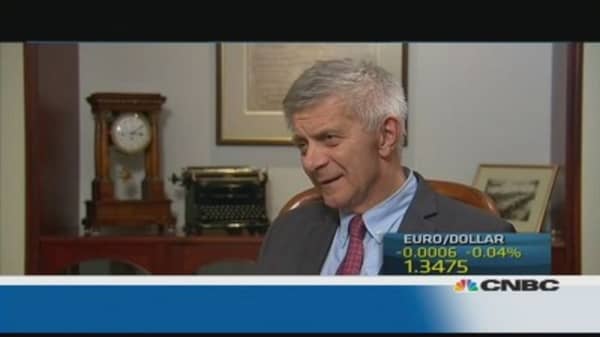Here is the Treasury's mirabile dictu: "Germany's anemic pace of domestic demand growth and dependence on exports have hampered rebalancing at a time when many other euro area countries have been under severe pressure to curb demand and compress imports in order to promote adjustment …"
What was the German government's response? "Incomprehensible," they said, about the Treasury's plain English and mainstream economic views. And with an angry swipe at Washington that it "should analyze its own economic situation," Berlin's finance ministry smugly brushed it all off saying that Germany's surplus was "a sign of the competitiveness of the German economy and global demand for quality products from Germany."
That is like saying "let's change the conversation." The fact remains that a large trade surplus is an indication of weak domestic demand, and that a systematic surplus in excess of 6 percent of GDP is a refusal to stimulate internal spending. In view of that, one can understand that Germany would rather not talk about this, because it is an unsuitable topic for a country whose trade surpluses accounted for 70 percent of economic growth in the last two years.
(Read more: German business: Europe should copy, not criticize surplus)
Is the ECB's monetary stimulus changing Germany's growth?
But the Treasury and Germany's long-suffering euro partners have two important allies.
The first one is the ECB, whose deft monetary policy may be beginning to make some headway. Euro area loans for house purchases – the most important segment of bank lending to households – increased 0.8 percent in the year to September, marking a slight acceleration from 0.7 percent in the previous month.
A lot of that mortgage lending is apparently taking place in Germany. Rents and house prices in the country's seven largest urban areas are 20 percent above the average – a flare-up Bundesbank attributes to low mortgage costs.
This is an excellent development because when people buy a house they also buy furniture, appliances, maybe even a new car. Germany's third quarter numbers for gross domestic product are showing some of that since consumer spending and construction sectors made a strong contribution to economic growth.
The other Treasury's ally is, improbably, Germany's Social Democrat Party (SPD) – the coalition partner in the next government with the right-wing Christian Democrats (CDU/CSU). Among the key SPD demands are pro-growth euro area economic policies, a more cooperative attitude toward euro area partners and a minimum hourly wage of 8.5 euros.
(Read more: EU exec opens Germany probe)
There are other things on its agenda, too. Trying to forestall the much feared sweep of radical right-wing parties (riding high on public discontent with unemployment and rising poverty) in next May's European parliamentary elections, the SPD seems determined to accelerate the monetary union's economic recovery. With an eye on 2017 elections, the SPD also wants to increase its political clout by binding together Germany's entire center-left political spectrum, and by actively cooperating with similar parties in France, Italy and other euro area countries.
This promises to usher in a period of hopefully friendly political tensions in Germany's next grand coalition government. And if, as the rumor has it, Germany's new finance minister were to be a convinced SPD Europhile, we may finally have the euro that truly speaks European.
Ready to bet on that? I am.
Follow the author on Twitter @msiglobal9
Michael Ivanovitch is president of MSI Global, a New York-based economic research company. He also served as a senior economist at the OECD in Paris, international economist at the Federal Reserve Bank of New York and taught economics at Columbia.






